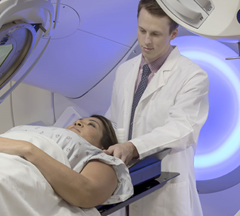Let Your Goals Guide Your Lung Cancer Treatment

Answer a few questions and we'll provide you with a list of primary care providers that best fit your needs.
No one wants to hear a diagnosis of lung cancer. But today, more than ever, doctors can offer you treatment options – and a voice in choosing them.
“Decisions are based on the type of lung cancer you have and the stage of the cancer, as well as other health issues you have,” says Jennifer K. Clune, MD, of Pulmonary and Critical Care Consultants, Inc.
Your own preferences, including what side effects you think you can tolerate, your lifestyle and schedule, and what makes you most comfortable all factor into what treatment choices are right for you.
“Sometime the goal is to eliminate your lung cancer, and sometimes the goal can only be to ease your symptoms,” Dr. Clune points out.
What Are Today’s Treatment Choices for Lung Cancer?
In the wide-range of treatment options, some patients will do best with just one treatment, while others may need a combination of treatments.
Surgery: Your doctor may consider one of three types of surgery:
- Lobectomy, the most common approach, entails removing the lobe (a section) of the lung affected by lung cancer.
- Pneumonectomy is removal of the entire lung.
- Segmentectomy. Removal of a larger portion of your lung than a wedge resection, without removing the whole lobe.
- Sleeve Resection or Sleeve Lobectomy. Removal of lung cancer located in a lobe and the bronchus, a tube that branches off the trachea and carries air into the lungs. After the portion containing cancer is removed, the ends of the bronchus are rejoined and the remaining lobes are reattached to the bronchus.
Radiation: Powerful, high-energy X-rays kill cancer cells or keep them from growing.
Chemotherapy: Drugs, taken as a pill or given by intravenous (IV) line, are used to shrink the tumor, kill any leftover cancer cells, or relieve lung cancer symptoms.
Targeted therapy: Medicines zero in on the specific changes in cancer cells or in nearby tissues that cause the cancer to grow and spread. “This is the newest therapy for lung cancer, the first advance in 20 years,” says Dr. Clune.
Immunotherapy: These medicines boost your own immune system to attack the cancer cells.
Some patients will do best with just one treatment, while others may need a combination of treatments.
Photodynamic therapy (PDT): A light-sensitive medicine is injected into your body, then a special light is aimed at the cancer cells, killing them.
Laser therapy: This approach treats the linings of airways to make breathing easier.
Radiofrequency ablation (RFA): High-energy radio waves heat and destroy the tumor.
“Generally speaking, small cell lung cancer is never treated with surgery. It can only be treated with radiation and chemotherapy,” says Dr. Clune. “Non-small cell lung cancer, the less aggressive type, is treated with one or a combination of treatments: surgery, chemotherapy, and radiation. Patients who have Stage 1 or 2 cancer (sometimes Stage 3), are candidates for surgery. Many of Stage 3 and all of Stage 4 are not candidates for surgery.”
Answer a few questions and we'll provide you with a list of primary care providers that best fit your needs.
Source: Jennifer K. Clune, M.D., Pulmonary and Critical Care Consultants, Inc.; MD Anderson; American Lung Association; cancercare.org; Centers for Disease Control and Prevention





